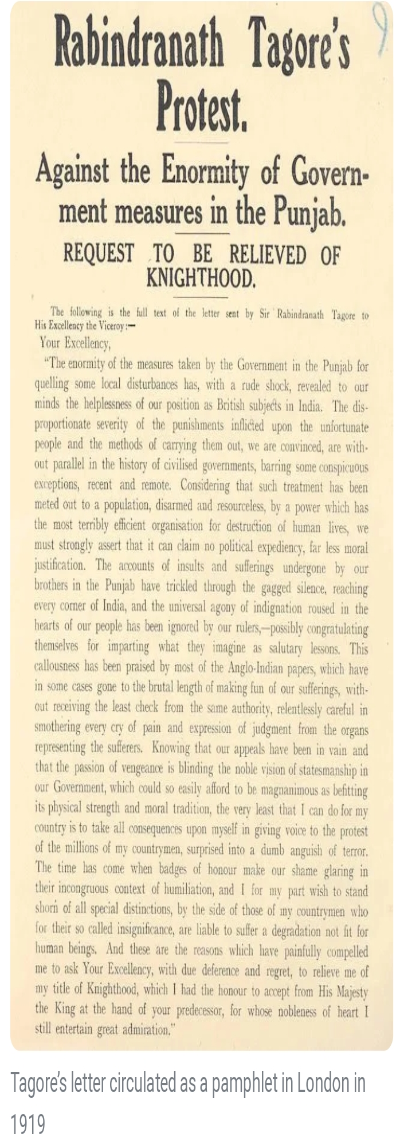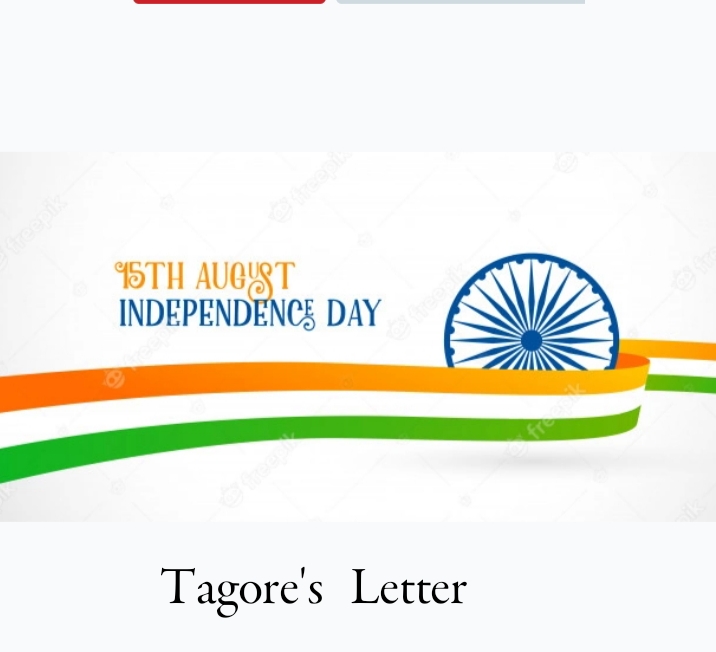
Jalliwan Wala Bagh massacre was staged on 1st April 1910. To a normal town crowd, celebrating festivities in an open ground, surrounded by walls, British had opened fire and killed 379 people.
But as they had gagged the media with an iron hand, the news was not published in any newspaper of the country. The people could nod know the brutality that had been inflicted upon.
Tagore got the news at his Calcutta residence from the words of some travelling dignitaries, visiting him. He seethed in anger against such oppression. He asked national leaders at Calcutta to protest against this barbarism. But their response was evasive. He then sent his emissary (CF Andrews) to Delhi to rope in national leaders there for this protest. But the emissary returned empty-handed. All leaders avoided any protest against British which would invite ire from them. The news of brutality was still not in open.
The day the emissary brought the news of cold shoulder of Delhi leaders, the poet sunk into an abnormal silence. He had been extremely angry and getting tormented inside. Such a shameful bigotry ! Such a dark mind behind a face in a lit up glare !
In the evening, an admirer paid a regular visit to poet’s home. But poet abruptly dismissed him, asking him to leave as he has a job at hand. Poet went to his room and closed the door. The light in the room shone whole of the night. He had not come out.
The admirer also got highly surprised. Such rudeness from the poet was unheard of. Back home, he tossed himself on his bed, had missed his sleep and feared for poet’s illness. Next morning at pre-dawn hours, he worriedly came again to poet’s house to enquire about his health. The servant disclosed that poet was awake all night. God ! what is brewing up ?
Then the poet came down the stairs to the sitting lobby. He was wearing signs of sleeplessness but looking cheerful. He greeted him and handed him a paper. It was a letter addressed to Governor General.
The admirer read it.
What a language, what a seething anger and disgust ! Also, a deep and intense empathy for the countrymen ! He got goose-bumps as his reading progressed. His anger against the action of British is woven around every firey line. And at the end, he renounced the Knighthood that Queen had conferred on him 4 years back (in 1915, he got Nobel in 1913).
The visitor looked up in amazement.
The poet was back in his jovial mood. A faint smile hanging over his face was expressive of deep satisfaction. He said, with his eyes set to something far away, as if words are coming from a deep crevice, when none is willing to come forward, at least I can do this. It does not warrant anyone’s participation.
The letter was released to press. The letter dt. 31st May 1919 was published in Statesman on 3rd June, 1919. It was circulated as a pamphlet in London.
The barbaric and inhuman act was avenged by Udham Singh 21 years later, in 1940 at London.
(Articulated by : Amitabh Moitro)
Tagore’s Letter
Transcript
31st May 1919
Helplessness of our position as British subjects
Your Excellency
The enormity of measures taken by the Government in the Punjab for quelling some local disturbances has, with a rude shock, revealed to our minds the helplessness of our position as British subjects in India. The disproportionate severity of punishments inflicted upon the unfortunate people and the method of carrying them out, weare convinced, are without parallel inthe history of civilised governments, barring some conspicuous exceptions, recent and remote. Considering that such treatment had been meted out to a population, disarmed and resourceless, by a power which has the most terribly efficient organization for destruction of human lives, we must strongly assert that it can claim no political expediency, far less moral jurisdiction. The accounts of our insults and sufferings undergone by our brothers in the Punjab have trickled through the gagged silence, reaching every corner of India, and the universal agony of indignation roused in the hearts of our people has been ignored by our rulers possibly congratulating themselves for imparting what they imagine as salutary lessons. This callousness has been praised by most of the Anglo Indian papers, which have in some cases have gone to the brutal length of making fun of our sufferings, without receiving the least check from the same authority – relentlessly careful in smothering every cry of pain and expression of judgement from the organs representing the sufferers. Knowing that our appeals have been in vain and the passion of vengeance is blinding the nobler vision of statesmanship in our Government, which could so easily afford to be magnanimous as befitting it’s physical strength and moral tradition, the very least I can do for my country is to take all consequences upon myself in giving voice to the protest of millions of my countrymen, surprised ina dumb anguish of terror. The time has come when badges of honour make our shame glaring in their incongruous context of humiliation, and I for my part wish to stand, shorn of all special distinctions, by the side of those of my countrymen, who for their so-called insignificance, are liable to suffer a degradation not fit for human beings. These are the reasons which have painfully compelled me to ask Your Excellency, with due deference and regret, to relieve me of my title of Knighthood, which I had the honour to accept from His Majesty the King at the hands of your predecessor, for whose nobleness of heart I still entertain great admiration.
Yours faithfully
Rabindra Nath Tagore
Calcutta, 6, Dwaraka Nath Tagore Lane.


Excellent